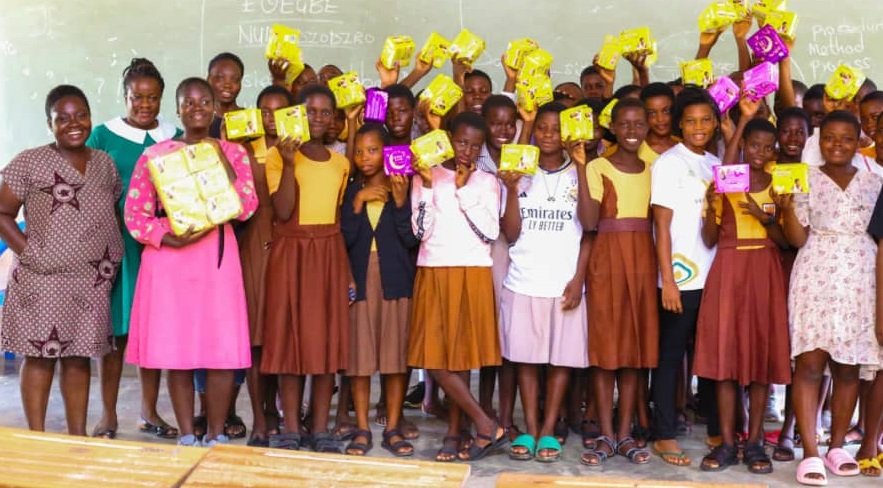News
Group pledges to eradicate menstrual poverty in Volta Region by 2030

Some students displaying their sanitary pads
Mr Yonah Keleku, the Executive Director and Project Lead at Developers Net, has pledged that his outfit will work towards the eradication of menstrual poverty and related problems among young girls in the Volta Region by 2030.
Developers Net is a youth empowerment and community development-related Non-Government Organisation (NGO).
Mr Keleku said: “There is a huge menstrual poverty in this area, where young girls are either ignorant of menstrual hygiene issues or lack the requisite access to menstrual hygiene products to take care of themselves during such periods.”
Mr Keleku gave the revelation during an outreach programme held on July 15, 2024, where the NGO donated menstrual hygiene products to some adolescent female students at Adzido Basic School with the Keta Municipality.
He disclosed to the Ghana News Agency (GNA) that the situation has a lot of tendencies to lure the girls into immoral temptations.
“All stakeholders must come on board to help our young girls overcome this situation. That is why Developers Net projected menstrual poverty eradication in the Volta Region by 2030,” he added.
Mr Keleku also explained that a new project would soon be launched to reach out to other parts of the region, especially in rural and hard-to-reach areas, for a similar outreach programme.
Madam Miracle Gidimadzor, a Public Health student, who took the students through sexual reproductive health and menstrual hygiene, said the exercise was timely.
“This will motivate the young ones who have just completed Junior High School.”
Over 40 adolescent girls have benefited from the gesture, with each receiving five packs of sanitary pads, coupled with the education on adolescent sexual reproductive health, and menstrual hygiene.
The team comprised health professionals from the Public Health Unit at the Keta Municipal Hospital and some students of the Keta Nursing and Midwifery Training College (NMTC).
-GNA
News
Man sentenced to 25 years for robbery at Manso Akwasiso

A 30-year-old man has been sentenced to 25 years imprisonment with hard labour by the Bekwai Circuit Court for his role in a 2022 robbery at a mining site at Manso Akwasiso in the Ashanti South Region.
The convict, Dominic Ofori, also known as Fanta, was arrested on 16th February 2026 after years on the run. He pleaded guilty before the Bekwai Circuit Court to robbery contrary to Section 149 of the Criminal Offences Act, 1960 Act 29, and was accordingly sentenced to 25 years imprisonment with hard labour.
On March 20, 2022, the Manso Adubia District Police received intelligence that a group of armed men from Manso Abodom were planning to attack a mining site at Manso Akwasiso to rob the owner of gold concentrate. Acting on the information, police mounted a coordinated operation and laid an ambush at the site.
At about 5:30 pm the same day, four-armed men arrived at the site, fired indiscriminately, and robbed the miners of their gold concentrate. The police team on surveillance intervened, resulting in an exchange of gunfire.
Three of the suspects, Abu Abubakar, Musah Latif, and Gideon Takyi, sustained gunshot wounds and were pronounced dead on arrival at St Martins Catholic Hospital at Agroyesum. Dominic Ofori escaped at the time but was later arrested and put before the court.
The Ashanti South Regional Police Command has assured the public of its continued commitment to combating violent crimes and bringing offenders to justice.
News
Ashanti police arrest man for publishing false news on TikTok

The Ashanti Regional Police Command has arrested 45-year-old Isaac Boafo, also known as “Duabo King,” for allegedly publishing false news intended to cause fear and panic.
Police said the arrest follows a viral TikTok video in which Boafo claimed that four officers at the Central Police Station in Kumasi engaged in inappropriate conduct with commercial sex workers during night patrols in Asafo.
Officers from the Police Intelligence Directorate (Ashanti Region) apprehended Boafo after receiving intelligence about the video.
During questioning, he admitted to creating the video to attract views and engagement online, and acknowledged that he could not prove the allegations.
Boafo also admitted making comments about the President of the Republic for content purposes and could not defend those statements.
He has been formally charged and is in detention as investigations continue.
The Ashanti Regional Police have warned the public against publishing or sharing false information on social media, noting that such acts can cause fear, panic, and damage reputations.
They said anyone found engaging in similar conduct will face legal action.
By: Jacob Aggrey






